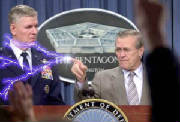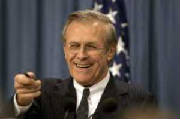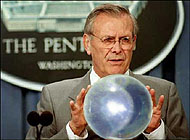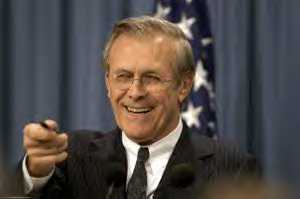Rumsfeld Speaks
At a press conference last week, Secretary Donald Rumsfeld explained that he declined
to testify before the Senate Armed Services Committee about the status of the Iraq war this morning because "my calendar was such that to do it...would have been difficult." Amidst a firestorm of criticism, Rumsfeld's schedule miraculously cleared up and, just a few hours
later, he agreed to testify. It will be the first time Rumsfeld has testified publicly about the war before the committee since February
2006. Much has happened in Iraq since then, and most of it has not been good. It remains to be seen when Rumsfeld and
the administration will make a serious change there.
- Since Rumsfeld last testified before Congress, things in Iraq have gotten worse.
Since February 2006 – the last time Rumsfeld appeared before the Senate Armed Services Committee – approximately 300 U.S. troops have died in Iraq, 2530 U.S. troops have been wounded, and well over 10,000 Iraq civilians have been killed. Insurgents have conducted an average of 620 attacks per week. In March there were 7.8 hours of electricity per day in Baghdad (down from 16-24 hours before the
war); last month there were 7.6 hours. In March Iraq produced 2.1 million barrels of crude oil per day (down from 2.5 million barrels per day
before the war) ; last month it produced 2.2 million barrels per day. In February 2006 there were 133,000 U.S. troops in Iraq, today there are 132,000 U.S. troops in Iraq, and the Pentagon plans to raise that number to 135,000.
- Rumsfeld’s claims that the Army today is “vastly better”
off is not true. Secretary Rumsfeld said that "the Army today is vastly better than it was two, four, six or eight years ago." It's not true. As Sen. Christopher Dodd (D-CT) argued on Tuesday, the Army is "very much worse off" than it was in late 1999 "when the military said two of the 10 Army divisions were ranked at the lowest
readiness level, C-4." According to a letter from a group of defense experts chaired by former Defense Secretary William Perry,
"two-thirds of the Army's operating force, active and reserve, is now reporting in as unready, and...there is not a single non-deployed Army Brigade Combat Team in the United States that is ready to deploy."
- The administration is still refusing to change the course in Iraq despite clear
evidence that their plan isn’t working. The Bush administration refuses to shift course to ease the burden
on U.S. forces. Last week, Rumsfeld "directed more than 2,500 U.S. troops who have spent the past year in Iraq to stay up to four months past their scheduled departure date, boosting the size of the U.S. force amid
unrelenting violence in Baghdad." The Bush administration, which continues to advance plans for special military tribunals
that violate the Geneva Conventions, are opposed by the military's top uniformed lawyers who testified again last week that
the current tribunal plans endanger U.S. forces serving around the world. Meanwhile, progressives in Congress are unifying around a plan to make progress in Iraq.
  DONALD, YOU SO FUNNY!!!
"I would not say that the future is necessarily less predictable than the past. I think the past was not predictable
when it started."
"We do know of certain knowledge that he [Osama Bin Laden] is either in Afghanistan, or in some other country,
or dead."
"We know where they are. They're in the area around Tikrit and Baghdad and east, west, south and north somewhat."
–on Iraq's weapons of mass destruction
"Death has a tendency to encourage a depressing view of war."
"Freedom's untidy, and free people are free to make mistakes and commit crimes and do bad things." –on
looting in Iraq after the U.S. invasion, adding "stuff happens"
"As you know, you go to war with the army you have, not the army you might want or wish to have at a later time."
"I am not going to give you a number for it because it's not my business to do intelligent work." -asked to
estimate the number of Iraqi insurgents while testifying before Congress
"I believe what I said yesterday. I don't know what I said, but I know what I think, and, well, I assume it's
what I said."
"Needless to say, the President is correct. Whatever it was he said."
"Reports that say that something hasn't happened are always interesting to me, because as we know, there are
known knowns; there are things we know we know. We also know there are known unknowns; that is to say we know there are some
things we do not know. But there are also unknown unknowns -- the ones we don't know we don't know."
"If I said yes, that would then suggest that that might be the only place where it might be done which would
not be accurate, necessarily accurate. It might also not be inaccurate, but I'm disinclined to mislead anyone."
"There's another way to phrase that and that is that the absence of evidence is not the evidence of absence.
It is basically saying the same thing in a different way. Simply because you do not have evidence that something does exist
does not mean that you have evidence that it doesn't exist." -on Iraq's weapons of mass destruction
"Well, um, you know, something's neither good nor bad but thinking makes it so, I suppose, as Shakespeare said."
  IRAQ -- RUMSFELD CALLED OUT ON WMD LIES:
Speaking in Atlanta last week, Defense Secretary Donald Rumsfeld was sharply questioned about his 2003 claims about WMD in Iraq. (Watch the video.)
Ray McGovern, a CIA veteran of 27 years, confronted Rumsfeld with his 2003 claim about WMD:
"We know where they are." Rumsfeld falsely claimed he never said it. McGovern then read Rumsfeld's quote back to him, leaving
the defense secretary nearly speechless: "My words -- my words were that -- no, no, wait a minute, wait a minute."
During Rumsfeld's speech, three protesters were removed by security and a fourth
protester stood in the middle of the room with his back to Rumsfeld in silent protest. Guards attempted to remove McGovern
as well.
Rumsfeld also received sharp questioning from a woman whose son was killed
in Iraq. She is now raising her grandson alone and asked if the government could provide any help. "Rumsfeld referred her
to a website listing aid organizations."
 
WASHINGTON (CAP) - After a blistering week in which several retired generals criticized Secretary of
Defense Donald Rumsfeld for not getting enough advice before charging into the Iraq war, Pentagon officials are fighting back.
"Psychics And Their Involvement In National Security Decision Making" outlines a series of talking
points that supporters of the embattled secretary can use while talking to the press. The principle point, of course, is that
Rumsfeld consulted extensively with psychic mediums before cranking up the quagmire.
From the memorandum: "Secretary of Defense Rumsfeld met a total of 48 times with a variety of psychics,
including the Reagans' own Joan Quigley, in the months leading up to the war. In addition to telling him that he would soon
meet a tall dark stranger, they recommended invading Iraq and stacking naked prisoners atop each other."
The memorandum also mentions that Secretary Rumsfeld makes use of a Magic 8-Ball, dice and a version
of Pin The Tail On The Donkey involving a world map and a big red pin with the word "Boom!" written on it in black magic marker.
President Bush was quick to leap to Rumsfeld's defense last weekend.
"Dummy's - err, I mean Rummy's - doing a heck of a job," the President said as he oversaw brush clearing
on the White House lawn for Monday's Easter egg roll. "He has my full supportitude. Plus, where would I get my pick three
numbers from? Heh heh."
The memorandum can be viewed in its entirety at http://pentagon.gov/rumsfeld/critics/stfu/douchebags.htm.
 
Memorable Quotes by Defense Secretary Donald Rumsfeld
"I would not say that the future is necessarily less predictable than the past. I think the past was not
predictable when it started."
"We do know of certain knowledge that he [Osama Bin Laden] is either in Afghanistan,
or in some other country, or dead."
"I believe what I said yesterday.
I don't know what I said,
but I know what I think, and, well, I assume it's what I said."
"Reports that say that something hasn't happened are
always interesting to me, because as we know, there are known knowns; there are things we know we know. We also know there
are known unknowns; that is to say we know there are some things we do not know. But there are also unknown unknowns -- the
ones we don't know we don't know."
"If I said yes, that would then suggest that that might be the only place where
it might be done which would not be accurate, necessarily accurate. It might also not be inaccurate, but I'm disinclined to
mislead anyone."
"There's another way to phrase that and that is that the absence of evidence is not the evidence of
absence. It is basically saying the same thing in a different way. Simply because you do not have evidence that something
does exist does not mean that you have evidence that it doesn't exist."
"Well, um, you know, something's neither good
nor bad but thinking makes it so, I suppose, as Shakespeare said."
"If I know the answer I'll tell you the answer,
and if I don't, I'll just respond, cleverly."
|

